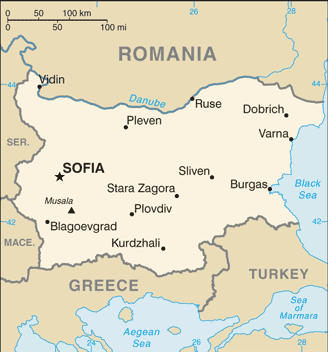By NewsDesk @infectiousdiseasenews
The Bulgaria Ministry of Health reported 41 additional COVID-19 cases in the past 24 hours, bringing the total to 2372 with 769 recovered.

The cases registered for the last 24 hours are reported in the following districts: Blagoevgrad – 1; Kyustendil – 1; Pazardzhik – 17; Pleven – 2; Smolyan – 1; Sofia – 8; Yambol – 11.
There are 125 deaths in which COVID-19 has been proven, with five deaths since the last 24 hours.
In addition, the Sofia News Agency reports national health inspector Prof. Todor Kantardzhiev announced at a coronavirus briefing that an outbreak of Q fever has been registered in Gabrovo.
More than 20 people in the area tested positive for Q fever and were initially tested for coronavirus.
Veterinarians and staff of two cow farms and one sheep farm were initially tested for coronavirus due to high fever. They instead tested positive for Q fever.
Q fever is caused by the obligate intracellular pathogen, Coxiella burnetii. The bacteria naturally infects some animals, such as goats, sheep and cattle. C. burnetii bacteria are found in the birth products (i.e. placenta, amniotic fluid), urine, feces, and milk of infected animals.
People can get infected by breathing in dust that has been contaminated by infected animal feces, urine, milk, and birth products. Some people never get sick; however those that do usually develop flu-like symptoms including fever, chills, fatigue, and muscle pain.
The mortality rate for acute Q fever is low (1–2%), and the majority of persons with mild illness recover spontaneously within a few weeks although antibiotic treatment will shorten the duration of illness and lessen the risk of complications. Chronic Q fever is uncommon but may cause life-threatening heart valve disease (endocarditis).
- Brazil: Coronavirus cases top 300K, Dengue closes in on 1 million
- Tick-borne encephalitis: ‘Most of the virus spreading events occurred in the last three or four centuries’ according to researchers
- COVID-19: Poor sanitation puts a quarter of the world’s population at risk
- Philippines COVID-19: Cases update, Testing requirements
- Dengue fatalities up in Pangasinan, Philippines
- Multistate outbreak of Salmonella Hadar infections linked to contact with backyard poultry


One thought on “Bulgaria: Outbreak of Q fever in the midst of coronavirus pandemic”